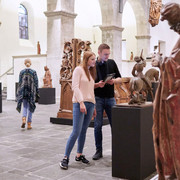Street art and Romanesque church? In Cologne, this combination fits perfectly and gives St. Cäcilien, one of the more modest of the 12 Romanesque churches, a special status. Here, in 1980, the famous sprayer Harald Oskar Naegeli immortalized himself with one of his dancing skeletons on the bricked-up west facade of the church. His urban art is even under monument protection.
Another special feature: Since 1956, St. Cäcilien has served as an exhibition space for a museum, the Museum Schnütgen for medieval art, allowing you to experience the precious collection of busts, sculptures, goldsmith and ivory works, as well as bronzes in an extraordinarily fitting, spiritual atmosphere. Romanesque church, graffiti, and museum — with a visit to St. Cäcilien, you combine several of Cologne's attractions at once.
In the 12th century, the Ottonian building was replaced by a new Staufer-era construction: a three-aisled column basilica without a tower. In 1474, the convent transformed into an Augustinian convent, adding a sacristy. Around 1850, St. Cäcilien served as the church for Cologne's first hospital. Old depictions still show large frescoes on the pillars of the church. Wall paintings dating back to around 1300 can still be seen in the choir today. Moreover, St. Cäcilien stands as the only extant example of the former typical juxtaposition of monastery and parish churches in Cologne, thanks to its direct proximity to St. Peter's parish church from the late Gothic period.
One of these skeletons from 1980 still dances its dance of death on the west facade of St. Cäcilien today, complementing the Memento Mori collection of the Museum Schnütgen and works of the street art scene in Cologne. As one of Cologne's 12 Romanesque churches, St. Cäcilien was placed under monument protection in 1980, including the skeleton. As a popular photo motif, it inspires some today for a shared little dance. Maybe you too?
Another special feature: Since 1956, St. Cäcilien has served as an exhibition space for a museum, the Museum Schnütgen for medieval art, allowing you to experience the precious collection of busts, sculptures, goldsmith and ivory works, as well as bronzes in an extraordinarily fitting, spiritual atmosphere. Romanesque church, graffiti, and museum — with a visit to St. Cäcilien, you combine several of Cologne's attractions at once.
History of St. Cäcilien**
The church traces back to a women's convent of the same name founded in the 9th century. Among the possessions of this convent was the painting "Madonna with the Violet" from the workshop of Stefan Lochner, which today ranks among the most prominent works of the Kolumba Museum.In the 12th century, the Ottonian building was replaced by a new Staufer-era construction: a three-aisled column basilica without a tower. In 1474, the convent transformed into an Augustinian convent, adding a sacristy. Around 1850, St. Cäcilien served as the church for Cologne's first hospital. Old depictions still show large frescoes on the pillars of the church. Wall paintings dating back to around 1300 can still be seen in the choir today. Moreover, St. Cäcilien stands as the only extant example of the former typical juxtaposition of monastery and parish churches in Cologne, thanks to its direct proximity to St. Peter's parish church from the late Gothic period.
A Final Dance of Death by Harald Naegeli — Danced on the West Facade of St. Cäcilien**
Harald Naegeli, the "Sprayer of Zurich," is today considered a pioneer of street art and a trailblazer for Banksy and ROA. Hunted in the '70s for his sprayed cloak-and-dagger operations, he fled to the Rhineland and continued his art in the cathedral city in the '80s. The poetry-less exposed concrete buildings seemed to challenge the artist, but medieval buildings also inspired him to engage, resulting in hundreds of anarchic skeletons and death symbols on the facades, motivated ex negativo by the sterility of urban spaces and directed against commercial art, pollution, bourgeois mentality, and not least, nuclear armament.One of these skeletons from 1980 still dances its dance of death on the west facade of St. Cäcilien today, complementing the Memento Mori collection of the Museum Schnütgen and works of the street art scene in Cologne. As one of Cologne's 12 Romanesque churches, St. Cäcilien was placed under monument protection in 1980, including the skeleton. As a popular photo motif, it inspires some today for a shared little dance. Maybe you too?
Useful Information
Openings
Dayoff: Monday
General Information
Parking Available
Bus stop available
Eligibility
Bad Weather Offer
Suitable for any weather
for Groups
for Class
for families
for individual guests
Suitable for the Elderly
Accessibility
The museum is wheelchair accessible. The main entrance on Cäcilienstraße provides barrier-free access to the museum foyer with its ticket office, information desk and store. From the designated parking spaces in the Cäcilienstraße parking garage, you can reach the foyer directly by elevator.
The checkroom and a handicapped-accessible restroom are located in the basement of the building and can be reached by elevator.
The special exhibition hall for temporary exhibitions is easily accessible from the foyer.
You will find seating in all exhibition areas. Folding chairs as walking aids or wheelchairs can be borrowed at the information desk.
Translated with www.DeepL.com/Translator (free version)
The checkroom and a handicapped-accessible restroom are located in the basement of the building and can be reached by elevator.
The special exhibition hall for temporary exhibitions is easily accessible from the foyer.
You will find seating in all exhibition areas. Folding chairs as walking aids or wheelchairs can be borrowed at the information desk.
Translated with www.DeepL.com/Translator (free version)
Parking facilities
Stop: Neumarkt
- Streetcar: 1, 3, 4, 7, 9, 16, 18
- Bus: 136, 146
Underground car park Cäcilienstraße (directly below the Museum Schnütgen)
- Streetcar: 1, 3, 4, 7, 9, 16, 18
- Bus: 136, 146
Underground car park Cäcilienstraße (directly below the Museum Schnütgen)
Our recommendations
Nearby











